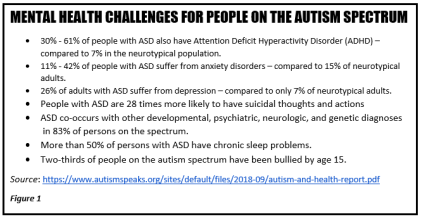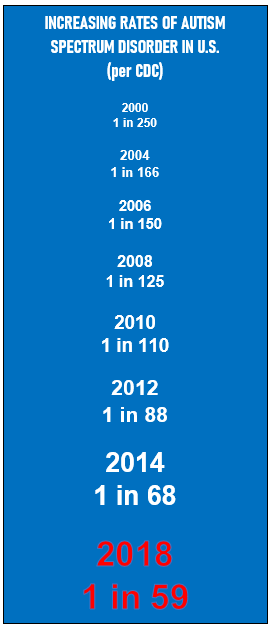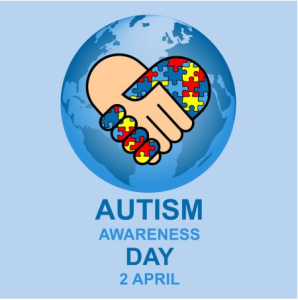“The largest problem is dealing with loneliness. That comes from the lack of social skills that we possess, being on the autism spectrum. People automatically assume that there’s something wrong with us and don’t want to associate with us.”
Like many students on the autism spectrum, Daniel Merkh, junior history and political science major, is smart enough to handle the academic challenges of college, but struggles with the social and emotional aspects of college life.

“The hardest thing about being on your own in college is how to maturely deal with conflict, and how to resist certain mental illnesses like depression and anxiety, how not to give in to those thoughts and feelings of, ‘I’m lonely and life is terrible.’”
Merkh reflects how students with autism spectrum disorders struggle with feelings of isolation and “social blindness” that make it difficult for them to succeed in college. In fact, people with autism are more prone to anxiety and depression than their neurotypical (or non-autistic) peers (see chart).
Autism, or autism spectrum disorder (ASD), is a range of conditions that are characterized by problems with communication, social skills and neuro-processing. ASD is called a “spectrum” because it has different subtypes, and the abilities of people with ASD can range from highly intelligent and skilled to severely challenged and non-verbal. Around 44 percent of people with ASD, however, have average or above average intelligence, making college a realistic option for them, with appropriate support. And yet, there is still a stigma associated with autism that makes students worry about acceptance.
“At first I wasn’t sure if I was comfortable disclosing my disability to some of my friends. I was a bit anxious to tell people that I was on the spectrum, because sometimes I feel like there aren’t many people that are understanding of autism or any sort of invisible disability,” Joseph Brennan, junior English major, said. “I was nervous that the professors weren’t going to be respectful towards me and my disability.”

Ironically, autism still has a stigma attached to it, and is widely misunderstood, despite its rising prevalence in the population. In 2018, the Centers for Disease Control and Prevention estimated that one in every 59 people in the U.S. is affected by autism. The autism rate has tripled since 2000 (see chart), causing the CDC to label autism as a “public health crisis.”
It’s a crisis for higher education, as well. The Americans with Disabilities Act (ADA) provides “reasonable accommodations” for students with disabilities so that all students have equal access to education. However, those basic accommodations do not provide the complex blend of academic, social and mental health support that students with autism need for success. Over the next decade, an estimated half a million students will be entering college, straining the ability of colleges and universities to support their unique needs.
ADA accommodations provide a foundation of support for students on the spectrum. Both Brennan and Merkh disclosed their autism spectrum disorder to the Disabilities Resource Center (DRC) when they enrolled at Cabrini, and receive support tailored to their challenges.
“For me personally, sometimes concentration can be a problem, because when I’m hearing the professors talk, I’m trying to process everything and it can be challenging to memorize everything that they’re saying while also taking notes,” Brennan said. “That’s why I have my Livescribe pen; it helps me take notes on things that I missed the first time.”
A student’s accommodations under ADA are outlined in a document called a VISA; if the student needs an accommodation in a class, they provide the VISA to the professor. Merkh’s accommodations include prompting professors to give him extra time to answer questions.
“I do have a slight processing delay, getting the words out of my mouth, rather than when I’m processing the information in my brain,” Merkh said. “I’m also allowed to record lectures and I’ve been granted a single room as one of my accommodations for housing.”
Non-classroom accommodations such as single rooms are important for students on the spectrum, who often need an escape from social interactions.
“Living in a single dorm has certainly helped my mental health,” Merkh said. “I don’t want to say that I can’t live with other people, but I have not had a good history with roommates at college so far.”
The social skills challenges that affect students with ASD in the dorm can affect their classroom performance, as well, when class participation and group projects are part of the grading equation.
“Group work, the dynamics within the group, may be challenging at first, because of the different personalities in a group, the different work ethics of people in the group,” Kathy Johnson, DRC Director, said. “Because they [students with autism] have set a high level of expectation for themselves, and therefore they assume other people will have the same work ethic, which isn’t always the case.”
“One thing about being autistic is that, generally, we can be very self-dependent,” Merkh said. “We don’t like to necessarily rely too much on others, because there have been experiences that I’ve had where teamwork generally has been, I’m trying to think of a better word, than unreliable, but basically I can’t depend on my teammates to do what they’re supposed to do. And then it’s either, the task is not done or I have to do it.”
Accommodations, such as professors’ selection of group members and supervision of group discussion, can help students with autism handle group projects better.
Support for students on the autism spectrum isn’t just about accommodations, however; it’s also about the environment for students with ASD. For example, research has shown that students with autism have much higher graduation rates from smaller colleges that value diversity and are close to home; conversely, they tend to struggle in larger universities far from home.
“Our classroom sizes tend to be smaller, so therefore, students have more of a voice. Professors have the opportunity to truly get to know their students because of the smaller number,” Johnson, said. “A large university may be a bit overwhelming for a student on the spectrum who doesn’t necessarily cope well with large, noisy, crowded environments.”
For Brennan, school size did matter in the college selection process.
“I only considered smaller schools because for me, it helped when I was in a smaller-sized classroom. It helped me concentrate, as opposed to being in a large auditorium filled with hundreds of kids at a big school,” Brennan said. “One of [Cabrini’s] pillars is respect, and that was one of the many things I was looking for in a college, was to be in an environment where people are understanding of you and treat you like a normal person.”

Even in a supportive environment, students with ASD can still struggle with mental health issues. Stress from chronic sleep issues, social issues and the effort of maintaining academic focus can contribute to anxiety and depression, even suicidal thoughts, in students with autism. The availability of on-campus counseling services is another factor that goes beyond ADA accommodations, yet many colleges have insufficient staff to meet the needs of their students.
“This school year I started seeing CAPS [Cabrini’s Counseling and Psychological Services],” Merkh said. “They have excellent counselors. I see one of them every Tuesday morning now. The counseling has helped me tremendously. It’s given me an outlet to express thoughts and it helps provide perspective to resolve any conflicts or issues that are problematic.”
For the most part, Merkh and Brennan have had positive experiences at Cabrini, in and out of the classroom.
“When I started at Cabrini and I was taking these classes and meeting all these great professors, I realized this really wasn’t bad,” Brennan said. “I don’t know what I was nervous about, because here at Cabrini they really do a good job in being respectful to all their students, whether or not they have a disability.”
“I participate in the chess club–I’m actually the vice president of the chess club–and I also have participated in the activities that are usually scheduled out by SEAL and CAP Board,” Merkh said. “I have found friends who I can relate to and who are willing to put up with my weirdness.”
Their experience is not typical, however. Fewer than 20 percent of students with ASD graduate after five years. One reason is insufficient support services, but a big factor is the continuing stigma of autism.
“I would just like to encourage people, especially young college students, to not be overly judgmental of others, of their peers, who may present with different behaviors; to seek out the individual to try to understand them, rather than jump to perhaps an inappropriate conclusion about who they are, what they are,” Johnson said. “My hope is that students and faculty become more and more open to understanding that we all have different strengths and challenges. And rather than jump to inappropriate conclusions, to get to know someone. Because everybody has something important to contribute to Cabrini.”



